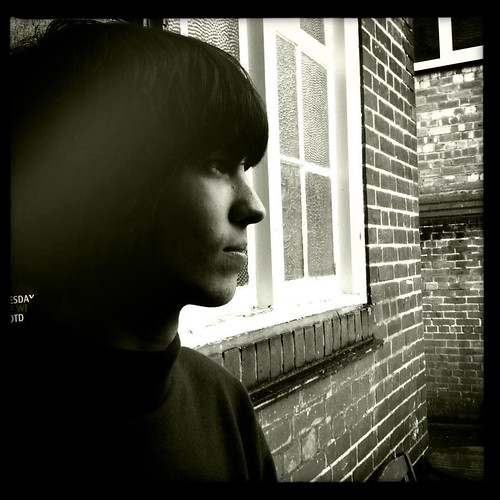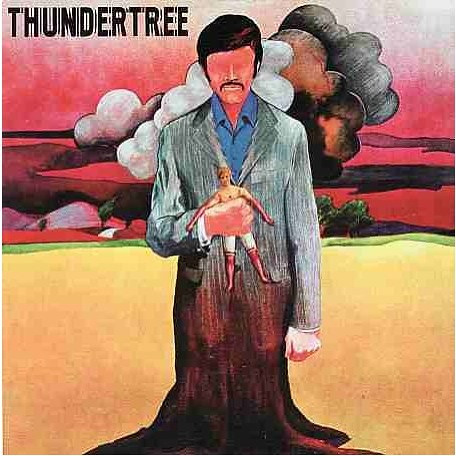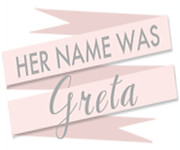
Hey, this week we are treating you to another wonderful guest post courtesy of The Moons' bassist, the lovely Thomas Edison Warmsley. Unveiling the paradoxical nature of piracy within music and a little insight into Thundertree, a 1970s psychedelic band/album released on a pirate label!
Disclaimer: She Dressed in Black does not condone piracy in any way, shape or form and would definitely not encourage you to scout out some rare but incredibly brilliant piracy gems ;)

God save EMI, why? because gutless, beatles-refusing, money-grabbing corporations create a thriving revolt of musical crime. While bludgeoning their chief executive Roger Faxon with a sharp orchestral instrument may seem like an obvious favourite, something potentially just as painful has happened to the major labels. Long before all music went digital, and popular torrent website Piratebay dwarfed HMVs advertising revenue, it's comforting to know that music piracy was as rife as it is today. Not only because it continues to make label giants look utterly stupid, but it has also kept afloat many lesser known and obscure releases from rock and roll past, earning many bands cult figure status.
Thundertree isn't a name most are familiar with, but their dayglo-painted masterpiece of an album cover is enough to make anyone snatch their hand and interrupt scouring the reliable 'rare psych' rack in a record store. Suspiciously wrapped in fresh film the record was branded with an odd looking label: Radioactive. Having never heard of this record label and remaining complacent about its peculiar 90s logo, research into Radioactive Records began.
“Radioactive is responsible for more than 200 unauthorized reissues of rare and collectable psychedelic records” was a common response from countless internet sources. The label ran by James Plummer is renowned for releasing obscure and unreleased bootlegs of artists such as Jimi Hendrix, Silver Apples, Fifty Foot Hose and then disappearing without trace. It turns out that this elusive Thundertree LP dating an original release from 1970, has since been hijacked and distributed by the pirate label, although you’ll be lucky to find a copy now, an original pressing on Roulette will cost you around £250. The process of stumbling across this grubby nugget of a record in an independent music shop is proof that, at least qualitatively, piracy works.
Thundertree - Thundertree

Minnesota probably isn’t renowned for being a native state of musical talent, although it is the birthplace of both Bob Dylan and the Andrews Sisters, but by the looks of it neither of them stuck around for long. But one band who may well have fallen into the crevice between 1969-1970 is this sole album release by Minneapolis collective Thundertree, a psych outfit marooned in the dull Midwest of the early 1970s.
While not much seems to be known about Thundertree, their founder and organist John Meisen appears to be the group's muso, and has an active history in the Minnesota music scene. When his previous band The Good Idea spilt in late 1968, Meisen recruited the writing skills of guitarist Bill Hallquist and on the back of a couple of promising demos Meisen signed his new project Thundertree to Roulette Records in 1969. It really was that simple to get a record deal in 1960s Minnesota.
Their self-titled debut features 12 tracks of psychedelic late-bloomers, where each could pass as an unearthed garage classic, which leaves you wondering what exactly the quintet were up to in the summer of 1966. But as a collective Thundertree achieves more than this, released in 1970 the album documents one of the more promising experimentations with psychedelia and progressive rock. Before you recoil with harrowing thoughts of tales about wizards and hammond organ episodes, the results are surprisingly good, making it a more sophisticated affair than some of their West coast peers.
Album opener Head Embers presents a stripped likeness to 13th Floor Elevators chordal stomp before eluding to a celestial coda, its refreshing to hear the fundamentals of progressive rock in such a primitive form. Followed by the tuneful At The Top of the Stairs, a convincing stab at psychedelic-pop and easily the album’s most radio-friendly track. Tinged with bristly organ and Meisen’s soulful English styled vocals, it is baffling how it managed to avoid the mainstream billboard in 1970. Meisen ponders “hanging on to a corner of a smile, I wonder why as the world goes by”, a critique of the mundane in the Midwest. Ballad Summertime Children and Dusty Road both appeal with originality, revealing a more progressive slant to their songwriting and a keen embellishment for ‘innovative’ studio techniques. With Meisen put in charge at the controls, the over-produced stereo organ on certain tracks quickly becomes an annoying gimmick, persistently darting from left to right - psychedelic quickly becomes psychotic.
Side B quickly redeems any lost credibility, with the majority of it taken up by 1225 a 16-minute medley that explores abstract themes over six tracks. While it indicates the hatchings of a progressive pomp nightmare, the six themes are strong enough to be songs in their own right. Things really begin to improve when the side B suite reaches Softly... a fantastical track brimming with originality, glistening orchestration and a nasty brass section that sounds like Miles Davis with a dreadful cold. The LP finale is a gleeful gospel soul rendition of The Sun Shines For Me, climaxing in an acapella round, leaving no stone of 1960s genre unturned, a fairly impressive album feat in just under 32 minutes.
































No comments:
Post a Comment